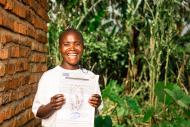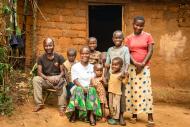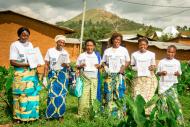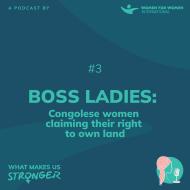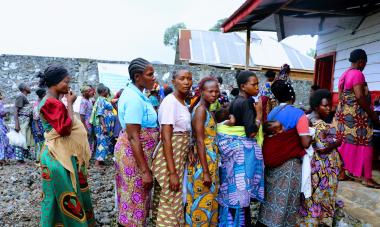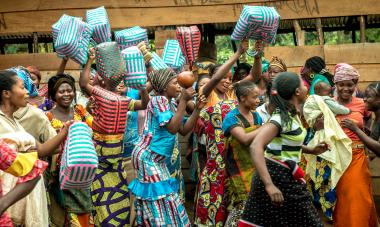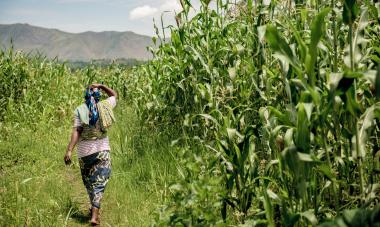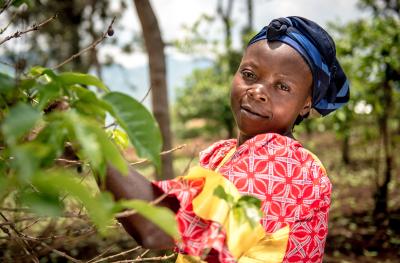When Angelique Nabintu Mwana Mupopo held her own land title in her hands for the first time, she was not defying the law. She was defying a long-held attitude of inequality in the Democratic Republic of Congo that has held back women’s economic advancement for centuries.
“I was so happy I could have jumped,” the 38-year-old mother of nine said, “but it was a public ceremony.”
Angelique’s joy could have come a lot earlier. In 2006 the DRC’s Constitution affirmed equal rights for men and women. The country also co-signed the Convention on the Elimination of All Forms of Discrimination Against Women, considered an international bill of rights for women.
To further strengthen gender quality, the DRC’s government recently amended family and land laws, and NGOs on the ground have been working hard as legal advocates.
But until now, reality had not kept pace with commitment.
There are many reasons why Congolese women like Angelique have not previously owned land. Extreme poverty. A cultural bias that denied women access to education. The native custom of passing down land only to sons.
But most of all, women did not know their rights.
To appreciate fully the significance of Angelique gaining her land title, let’s zoom out first to understand the economic irony rampant in her country.
While the DRC is the second largest land mass in Africa, extremely rich in natural resources (in fact, two-thirds of its lands - rainforests - are crucial to the planet’s climate cycles), it is also one of the world’s poorest countries. Ethnic hostilities, natural resource exploitation, a history of greedy dictators, and a weak infrastructure have all impacted on its inability to stabilize.
As a result, many rural and indigenous populations are facing land insecurity. And women are most at risk.
Yet evidence has shown that supporting women’s access to land empowers them to achieve larger developmental goals, including access to credit and loans. As women become stronger and more self-sufficient, they improve the economic future of their country.
Angelique’s acquisition of land in her native village of Nyangezi is a role model of success but not without struggle.
In 2017, when Angelique first heard about WfWI’s programs from her village chief, she was working on other people’s farms for about a dollar a day. When her husband, a mason, broke his leg and could no longer work, she had no way to support her family.
Our Stronger Women, Stronger Nations program introduced Angelique to social and economic skills, including information about women’s rights. Then her peers chose her to join our Change Agent program, where she received advocacy training.
But when she and her husband attended a couples-dialogue session about land heritage, she witnessed first-hand the controversy the topic could stir.
One man even said, “My ancestors didn't allow women to own land, so I won't be the first to change.”
Angelique understood.
“There was a time when my husband told me I have no say because he is the one who inherited the land.” After the session, he even asked her privately whether giving women the right to acquire land might lead them to divorce their husbands.
But Angelique had been well schooled. “I told my husband that the aim of the session was to change the community's mentality about land management.”
But when he accompanied her to her village so that she could share what she had learned about land rights, he suddenly made a surprising announcement in front of everyone.
“It’s true,” he said. "Men should set the example, and I am now ready to give you land of your own.”
Today, new title in hand, Angelique is happily playing “boss lady” to others. She is earning more income and can support her family. She is also expanding awareness throughout the entire community, particularly about women's rights.
And not just Angelique. To date, WfWI has successfully overseen 145 land titles provided to women, with another 300 or so pending.
One of the keys to WfWI’s success is involving men in the community as allies.
Halfway through the project, it was learned that each of the 20 men engaged as leaders had granted land to their wives as a result of being introduced to the concept.
At its essence, land ownership not only allows a woman to generate income in the current moment, it allows for the possibility to receive dividends for the rest of her life.
Today Angelique is dreaming about the rest of her life, and beyond. “Today, if the land is sold, I must be involved and that makes me happy.” She plans to use the land for both her sons and daughters so they can build or farm themselves.
“But my biggest dream is that my daughters will be married, like I was to their father, and be given land too.”
“For the women in our program,” says Rachel Boketa, WfWI’s country director for the DRC, “our work is an eye-opener. In the beginning our participants can’t even imagine such things exist. Today Angelique is her own Boss Lady.
“What’s beautiful is that my colleagues and I come from urban centers and we can act as role models. I own properties. I own land. And I am a woman. That says to them,’Hey, this can change.’And they can see it with their own eyes.”
As we approach #EndPovertyDay, invest in the economic power of more women like Angelique.
Learn More About Angelique and Our Work in DRC by Listening to Our Podcast Episode 3:
Even though most farm workers in developing countries are women, very few of them own the land they work on. Some rural communities ignore the law and forcibly seize land from women or prevent them from buying or inheriting land in the first place. In this episode, Nisha hears from Angelique, a Congolese woman who tried to persuade a skeptical community that she had just as much right to own land as her husband. Nisha also talks to Rachel Boketa, the Country Director of Women for Women International in the Democratic Republic of the Congo and Sabreen Alikhan, our Director of Monitoring, Evaluation, Research and Learning about a project to support women like Angelique to become advocates for equality as well as ‘boss ladies’ in their own right.

